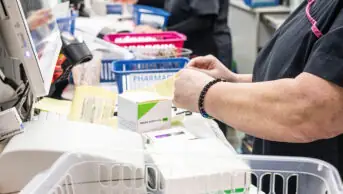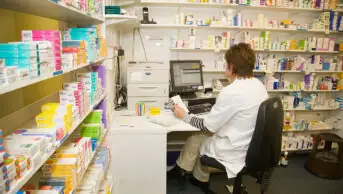
University of Bradford
Pharmacy students at the University of Bradford do not have traditional lectures. Instead, across the majority of the programme, students work in teams to solve real-world problems through discussion and application of knowledge using the latest in educational technology. This is thanks to the efforts of senior lecturer in pharmacy practice Simon Tweddell, who was recently awarded the prestigious National Teaching Fellowship. The accolade, from the Higher Education Academy, is bestowed upon those who demonstrate excellence in higher education teaching and support for learning.
The award celebrates Tweddell’s efforts in revamping the MPharm programme and introducing so-called “team-based learning” as a teaching style. “I knew there were some challenges associated with engaging students rather than sitting passively in lecture theatres trying to absorb information,” he says.
Tweddell put together a stakeholder group, including employers from the community and hospital sectors, alumni from the course, final-year students and a patient representative. “We wanted to develop a programme that was informed by what a day-one pharmacist needed to be able to do and design the course backwards from there,” he says. “Teamworking skills, communication skills and problem-solving were all important attributes to employers. Even skills in teaching others were key, because pharmacists will go on to teach both patients and other members of the healthcare team about medicines.”
Flipping the classroom
The concept of team-based learning comes from a business professor in the United States in the 1970s, however it is now being used to some degree in approximately one third of US pharmacy schools. Bradford is the first university in the UK to use it across a whole programme. It involves a “flipped classroom”, where students are given guides, including written resources, websites, or videos and podcasts, before coming to class. Immediately upon arriving in class, students are asked to complete a short test on the material using a hand-held device, which gives teachers feedback in real time. “This test motivates students to prepare for class,” Tweddell explains. “We know from the results what they have understood and what they haven’t, so it gives us feedback. When you’re giving a lecture, you don’t know whether you’re pitching it too high or too low and if it’s being understood by the audience.”
Once they have completed the individual tests, they break off into their groups, which are allocated at the beginning of the academic year, and complete the same test as a team. They discuss the question, agree on an answer and use a specially designed scratch-card to receive immediate feedback on whether they are correct or not. After the test results are in, staff spend up to ten minutes going over any concepts the class found challenging.
“Then the fun part starts,” Tweddell enthuses. “The majority of class time is spent on applying that knowledge to real world authentic problems that have been brought in from pharmacy practice. So it might be from case studies, it might be around making a diagnosis, it might be coming up with a management plan.”
Having made their collaborative decisions, the teams simultaneously reveal their chosen solution to the entire class of up to 18 teams. The class then discusses the outcomes as a whole group, with different teams explaining why they chose the answers they did. “It’s taking a much deeper approach to learning than just sitting listening, because they have made that decision… then they defend it and quite passionately at times,” says Tweddell. “When it works really well, you’ve actually got the debate going between the teams and you’re just sat on the side lines, enjoying the discussion that is going on.”
Keeping it real
Tweddell himself graduated from the University of Bradford in 1991 and began his career in community pharmacy. “I spent six years working for a small community pharmacy called Foster and Plumpton, which was bought out eventually by Lloydspharmacy,” he explains. “After I’d been qualified for three years I took my first preregistration trainee and found I really enjoyed teaching others about pharmacy.” Lloydspharmacy offered a teacher-practitioner post at the University of Bradford for pharmacists who wished to split their time between the pharmacy and the lecture hall, which Tweddell decided to apply for. “It involved three days working for the university, teaching pharmacy to the university students, and two days working in practice,” he remembers. “I was aiming to bring contemporary real world experience into the classroom. I did that for four years — I really enjoyed it, particularly the teaching side. And then an opportunity came up in 2001 to apply for a full-time post here as a senior lecturer.”
After securing the senior lecturer role, Tweddell went on to fulfil a number of roles at the university, including a six-year stint as programme leader, where he was responsible for managing the programme, supporting students and ensuring the course was fit for purpose. “I didn’t know as much about educational theory at that point,” he explains. “The course was more like disparate modules, which had the subject content, but we didn’t find it was leading towards the sort of outcomes we wanted to achieve.” Tweddell then took on a management role as head of pharmacy practice from 2006 until 2011, when he started work on the new course.
Training the trainers
Changing the style of teaching so radically presented some challenges, particularly for staff. Tweddell explains that, initially, one third of affected teachers were enthusiastic about the idea, one third were undecided and the remainder preferred a more traditional approach, including lectures and seminars. “Facilitating this type of learning requires a different skill for the instructors,” he says. “Many of us had perfected our abilities at delivering content talking at students in lectures but team-based learning requires that instructors facilitate the discussion by drawing out the answers from the students, not just giving the answer. That was a new skill for many of us.”
Tweddell’s research with his own students demonstrates the value of team-based learning, suggesting that those who have studied this way performed around 13% better than those who learnt in more traditional environment. Teachers are also seeing the benefits now, he says: “I’ve been interviewing staff — certainly, the vast majority of the staff believe it’s the right thing to do. And the engagement and enthusiasm that you get in the classroom with students wanting to come up with the answers and talk about it — it’s much more fun for both students and staff than just standing and talking at students.”
Tweddell is now Europe’s first accredited consultant trainer for team-based learning, having spent a year building a portfolio. He provides in-house training for staff and is helping to implement the teaching style across the university and further afield. “I’m passionate about team-based learning so I want to continue to spread the word about it,” he says. “The Faculty of Health Studies [at the University of Bradford] is now using team-based learning in some modules in nursing, midwifery and physiotherapy, and they are now developing it in our Faculty of Management and Law,” he says. Other universities with whom Tweddell has spoken include Reading, Anglia Ruskin, Wolverhampton, Durham, Sunderland, Manchester, Robert Gordon and Sheffield. “I’ve also been over to a medical school in Amsterdam… I’ve done some staff training so they can introduce it across their programme,” he adds.
Strategic planning
Tweddell has been on secondment for the past 15 months, working to help other leaders within the university to introduce new programmes. “I’ve been working with the faculties of health, management and law, social studies, and engineering and informatics to encourage them to take an evidence-based approach to their design of their curriculum,” he explains. “That’s taken me out of pharmacy to work with other disciplines and it’s been a really useful and interesting experience — it broadens your horizons.”
The University of Bradford has offered a five-year integrated pharmacy degree since 1970, where the preregistration year is incorporated into two six-month placements. Tweddell is an advocate of this programme. “I would actually go further still and have longer periods of placements within first, second and third year,” he states emphatically. “I’ve seen students coming back off placement — they do mature, they do benefit hugely from that real world experience and bring that back into the classroom. And because they’ve all had different experiences they can share these with their peer group when they get back from placements. Peer learning can be so rich.”


